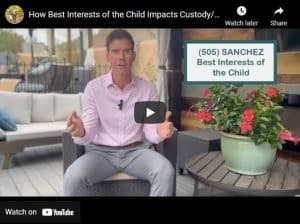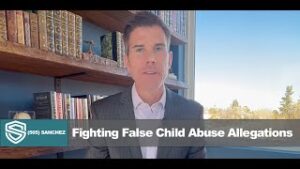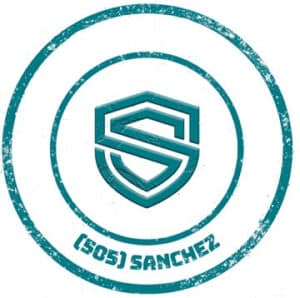
Wrongly accused parents are often curious about parental alienation and its impact on custody decisions.
In New Mexico, parental alienation is the act of one parent manipulating a child to turn against the other. In short, parental alienation has an immense and negative impact on child custody cases.
When parental alienation is found, the behavior may result in one parent losing their custodial rights. In some situations, primary custody can be flipped from one parent to the other. Moreover, when alienation is found, a parent can go from primary custody to supervised visitation.
THE IMPACT OF PARENTAL ALIENATION ON CHILD CUSTODY CASES IN NEW MEXICO
Parental alienation can be a serious problem in many divorce and child custody battles. It involves one parent attempting to manipulate their child’s emotions and beliefs, in essence poisoning the child’s mind against one parent.
Parental alienation is an important factor considered in child custody cases in New Mexico, as it can greatly impact the court’s final custody decision.
In New Mexico, family courts often use a combination of court proceedings, counselors/therapists, and evaluators to determine if alienation has occurred.
Like other child custody issues, the court bases its final decision on the child’s best interests.
Watch this video for more information about how the best interests of the child impacts child custody cases.
SIGNS OF PARENTAL ALIEANTION IN NEW MEXICO
In New Mexico, there are common signs that suggest parental alienation is present.
These tell-tale signs include a parent attempting to turn a child against the other parent. In other situations, one parent may deliberately undermine or poison the relationships between a child and parent through badmouthing, inappropriate comments, or suggestions.
Ultimately, the assigned family court judge examines all factors when deciding the appropriate custody and visitation schedule.
Here are some classic signs of parental alienation:
- Badmouthing or insulting the other parent;
- Coaching a child’s statements;
- Wrongfully denying visitation and communication;
- Repeatedly filing false restraining order of protections;
- Repeated and false CYFD allegations.
Watch this video to better understand how to fight false claims of child abuse during child custody cases.
EASY TO CLAIM AND SOMETIMES HARD TO PROVE
Any parent can claim parental alienation.
In fact, parents often claim that alienation has caused a breakdown in the parent-child relationship.
On the other side, the opposing parent may claim:
- Violence, abuse, or neglect;
- Substance abuse;
- Mental health issues;
- Unsafe home environment;
- Child disclosures of abuse or neglect;
- Absence/indifference caused the breakdown.
The judge hears both sides of the argument. At times, both sides are compelling. If so, the judge often needs more information to determine if parental alienation occurred.
FAMILY COURT JUDGES HAVE A DUTY TO PROTECT CHILDREN
In New Mexico, family court judges have a duty to protect children. In turn, judges that fail to protect children are routinely blasted on the news and media.
Because of this duty to protect, judges usually error on the side of caution to protect children.
In doing so, the judge usually requires a psychological evaluation, or third-party opinion regarding alienation.
Alienation cases often involve a breakdown in the parent and child relationship. Often, one parent claims that alienation caused the breakdown. Conversely, the other parent claims that one of the factors above caused a breakdown with the parent and child relationship.
In other words, both parents usually point a finger at each other. Both arguments may be compelling.
Consequently, judges often find that the necessary first step is to mend the broken relationship.
In other words, at times, judges are more concerned with correcting the underlying breakdown in the relationship than blaming one side.
In many cases, this breakdown has been cemented over time. For instance, sometimes years pass between the breakdown and the court addressing the issue.
Depending on the time and severity, fixing the underlying problem can be a lengthy, complex, and expensive process.
PROVING ALIENAITON CAN BE A LONG, COMPLEX AND EXPENSIVE PROCESS
Understandably, many parents want an immediate finding that parental alienation occurred. In doing so, the parent wants an immediate and substantial change to the current custody and visitation schedule.
Nevertheless, most alienation cases unfold over a long period of time. The time and process often include repeated court proceedings. During these repeated court hearings, a parent may show their true colors and behavior.
Moreover, alienation cases often involve involvement with court appointed evaluators and counselors.
The court appointed evaluators often include Guardian Ad Litem, 11-706 experts, or Court Clinic.
These evaluators work in tandem with the child’s individual counselor, and family counselors.
Ultimately, the parties interact to reach agreement on the appropriate pace of reintegration. In some situations, the parties work together and find that parental alienation has occurred.
SOMETIMES ALIENATION IS DIFFICULT TO PROVE
Parental alienation is a legal conclusion. Often, judges require a qualified health care professional to make a finding of parental alienation.
For whatever reasons, healthcare professionals can be reluctant to find alienation has occurred.
Possibly this reluctance is based on fear of lawsuits or professional complaints.
Alternatively, possibly counselors and therapists are reluctant to say alienation occurred because the parent’s are adept manipulators.
For whatever reason, GALs, 11-706, counselors, and Court Clinicians tend to shy away from testifying that parental alienation occurred.
CHILD DISCLOSURES OF ABUSE OR NEGLECT
At times, child disclosures of abuse or neglect present the biggest hurdle with parental alienation cases.
You see, judges are highly concerned by a child’s disclosures of abuse or neglect. This concern is present even when the child’s disclosures appear patently false.
True or not, the disclosures show a breakdown in the parent-child relationship. Moreover, these disclosures may be coupled with threats of self-harm.
Consequently, even false child disclosures create concern. In turn, this concern usually leads to therapeutic intervention to mend the broken relationship. Specifically, the court may find that reintegration therapy is needed.
This therapeutic process often shocks parents that want an immediate finding of alienation and corrective action.
Unfortunately, the therapeutic process involved with most alleged alienation cases can be a long process.
FAMILY VIOLENCE AND CHILD CUSTODY ATTORNEY NEAR ME
Are you researching parental alienation and its impact on custody decisions in Albuquerque, New Mexico? If so, does your case involve CYFD involvement, restraining orders, or allegations of domestic violence?
You have found the right child custody and domestic violence attorney for your case.
For over a decade, Sanchez has handled restraining order, child custody, and alienation cases across New Mexico.
Sanchez routinely handles child custody cases in Albuquerque, Rio Rancho, Los Lunas/Belen, Santa Fe, Socorro/Estancia, Gallup/Grants, or Taos Los Alamos.










